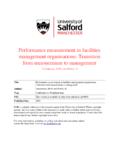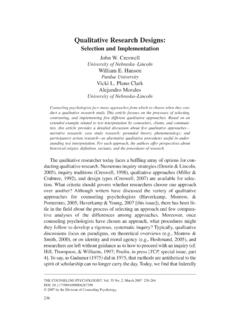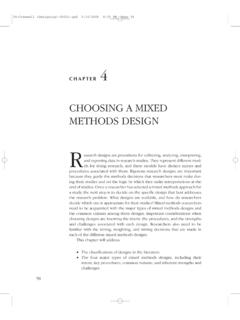Transcription of Case study research methodology - University of Salford
1 case study research methodology Widdowson, MDJ. Title case study research methodology Authors Widdowson, MDJ. Publication title International Journal of Transactional Analysis research Publisher the European Association of Transactional Analysis (EATA). Type Article USIR URL This version is available at: Published Date 2011. USIR is a digital collection of the research output of the University of Salford . Where copyright permits, full text material held in the repository is made freely available online and can be read, downloaded and copied for non-commercial private study or research purposes. Please check the manuscript for any further copyright restrictions. For more information, including our policy and submission procedure, please contact the Repository Team at.
2 case study research methodology 2011 Mark Widdowson modalities of psychotherapy are often influenced by Abstract several key case studies which triggered innovative Commenting on the lack of case studies published in thinking or methods in the originator(s) of the therapy, modern psychotherapy publications, the author reviews or cases that were used to test out and verify the the strengths of case study methodology and responds effectiveness of the new therapy, or to explain key to common criticisms, before providing a summary of features of the therapy and how it works to a wider types of case studies including clinical, experimental audience (see also Berne, 1961). and naturalistic.
3 Suggestions are included for developing systematic case studies and brief In the practice of psychotherapy, the most basic unit of descriptions are given of a range of research resources study is the case (Eels, 2007). Single- case studies that relating to outcome and process measures. Examples allow for the examination of the detailed unfolding of of a pragmatic case study design and a hermeneutic events across time in the context of the case as a whole single- case efficacy design are given and the paper represent one of the most pragmatic and practice- concludes with some ethical considerations and an oriented forms of psychotherapy research . (Fishman, exhortation to the TA community to engage more widely 1999, 2005) (Iwakabe and Gazzola, 2009.)
4 Within in case study research . psychotherapy, a case study may be of a single episode within a session, a single session, a particular phase or Key words chunk of therapy or an overview of the entire therapy. case study design, case study research Despite the historical significance of case studies in the Introduction development of psychotherapy, there are few case case study methodology is becoming increasingly studies published in modern psychotherapy books and influential in psychotherapy research . Although journals. Within the TA literature there is a lack of therapists tend to write case studies as part of their detailed case studies which provide the reader with a training, there is a definite need for the training of clear sense of the work, and sufficient information to psychotherapists in case study research methodology come to their own conclusions regarding the outcome.
5 And developing the skills needed to design rigorous and Of the case studies which are available, like the case scientific systematic case studies. The aim of this article studies of Freud, they each tell a story, but do not is to provide the reader new to case study research with provide the required evidence needed for scientific a background in the method to assist them in creating inquiry or for reliable conclusions to be drawn from the and developing case study research and of contributing presented cases. this to the TA research literature. Although written for a psychotherapy audience, the key principles of the The psychotherapy research community has recently methodology can be extracted by practitioners from begun to turn its attention to case study methodology other fields and applied to their own situation.
6 And how this research approach can be rigorously enhanced so that reliable conclusions can be identified The development of psychotherapy has been influenced from the studies. case study methodology is growing in from the beginning by the writing and publishing of case significance as a method highly suitable for use in studies. Freud s (1901, 1909) now famous cases were psychotherapy research and the view is gaining highly significant in the development of psychoanalysis. momentum that case study methodology will develop case Studies were also influential in the development of into the next important area of psychotherapy research behavioural therapy (Wolpe, 1958), and indeed most (McLeod, 2010).
7 Kiesler (1983) states Studies International Journal of Transactional Analysis research Vol 2 No 1, January 2011 Page 25. seriously pursuing these [psychotherapy] change- Second, cases are important for researchers' own process goals cannot attain them by use of traditional, learning processes in developing the skills needed to do rigorous experimental or nomothetic designs. Instead, good research . If researchers wish to develop their own what seems to be most appropriate and necessary are skills to a high level, then concrete, context-dependent small N or single- case studies. (Kiesler, 1983. ). experience is just as central for them as to professional Certainly well-constructed and thorough case studies learning of any other specific skills (Flyvbjerg, 2006.)
8 Can be used as reliable evidence for the impact of the ). therapy in effecting change. case study methodology is also highly relevant to a postmodern perspective to psychotherapy with its The strengths of case study methodology accounting for a range of factors in the work. Predictive Single- case research is best viewed as a sub-class of theories and universals cannot be found in the study of intrasubject research in which aggregation across cases human affairs. Concrete, context-dependent knowledge is avoided and the generality of one's findings is is, therefore, more valuable than the vain search for addressed through replication on a case -by- case basis.. predictive theories and universals (Flyvbjerg, 2006: (Hilliard, 1993: 373-4).
9 224). case studies generate context-dependent knowledge which is an appropriate form of knowledge The case study offers a rich method for investigating base in social sciences and disciplines based on and researching a single case . The effectiveness of the observation and understanding of human behaviour and approach being researched can be verified by interaction in context. Flyvbjerg emphasises in the replication of outcomes across similar cases. Due of the social and human behavioural sciences context- level of detail kept in the case record, outcomes of dependent knowledge and experience (is at) the very different but similar cases can be compared, and the heart of expert activity (Flyvbjerg, 2006.
10 P222). specific variables which might have impacted upon the difference in outcome can then be investigated This position is based on the ability of experts to move separately. In psychotherapy research , case study beyond rigid, rule-bound approaches to ones which methodology has the advantage of being closely linked embrace complexity and require the higher level of to therapy as it is usually delivered. The case study is theoretical and intellectual abstraction which is relevant measuring what actually happens in the therapy in professional training programmes. Flyvbjerg goes on situation, rather than creating some tightly controlled to state that presenting and discussing case studies is situation that may bear little resemblance to therapy an important teaching method for imparting practical as usual.













